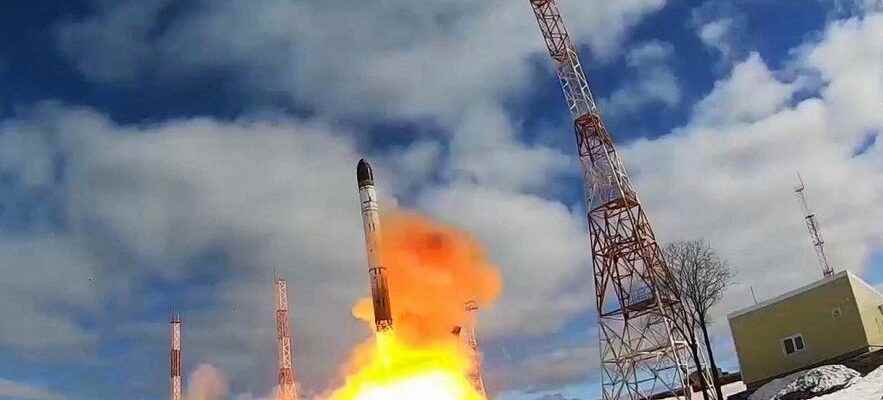Vladimir Putin is once again waving the nuclear bogeyman. The Russian president announced on March 25 that he was going to deploy “tactical nuclear weapons” on the territory of his Belarusian ally. Ignoring the strong criticism from Western countries this weekend, Moscow reaffirmed on Monday that they will have “no impact on Russia’s plans”. Intended to “scare Westerners”, this announcement does not, however, change much of the situation on the ground, believes Jean-Louis Lozier, former head of the nuclear forces division of the French general staff, now adviser to the Center for security studies from the French Institute for International Relations (Ifri).
L’Express: By announcing that Russia was going to deploy tactical nuclear weapons in Belarus, what signal did Putin want to send?
Jean-Louis Lozier: There is probably a desire to scare Western countries, even if, so far, the nuclear threat has not made them back down. We were able to realize that his previous attempts at intimidation, such as the suspension of the New Start treaty last February, or his threats at the start of the war, did not arouse a wave of panic. On the Russian political scene, this announcement can also be seen as an affirmation of the power that Putin exercises today in Belarus. This allows him to establish a form of vassalization of his neighbor.
Vladimir Putin continues to subscribe to the nuclear rhetoric he has used since the start of his invasion of Ukraine. He seems to present this decision as a response to the UK’s desire to supply depleted uranium munitions to Ukraine. However, these two types of weapons have nothing to do: depleted uranium munitions are in no way nuclear weapons. They are conventional ammunition whose metallic properties provide better armor penetration, but they do not have a radioactive effect. I suppose there is an effect of opportunism in the fact that Putin puts these two weapons on the same level. He plays on the word “uranium” to sow confusion, because this term often refers to nuclear weapons in people’s minds.
Is this announcement by the Russian president really a surprise?
In reality it is only a half-surprise, because the ground had already been prepared. Let us remember that the Belarusian leader, Alexander Lukashenko, had already modified the Constitution of his country in 2022 to be able to accommodate Russian nuclear weapons on its territory. So we could expect this development. Moreover, we can also put this announcement by Putin in a more global context of violation by Moscow of its commitments in the nuclear field. After the violation of the treaty on intermediate nuclear forces, and the suspension of New Start, it takes an additional step in the questioning of the treaties which existed until now around nuclear power.
A photo released by the Russian Defense Ministry shows the test launch of an RS-28 Sarmat intercontinental ballistic missile from the Plesetsk cosmodrome, Russia, April 21, 2022.
© / Sputnik via AFP
Should we fear the use of these tactical nuclear weapons in Ukraine?
I remain convinced that the probability is extremely low. Especially since the Ukrainian theater does not lend itself well to the use of nuclear weapons. There is not a large enough concentration of troops or armor on the battlefield. Therefore, the use of a nuclear weapon would have a relatively limited tactical impact. On the other hand, the risks associated with the use of such a weapon would be considerable: it would call into question a taboo in place since 1945. This would have immense and unpredictable consequences on the international order.
Has Russia’s nuclear posture changed since the beginning of this conflict?
No, not since the beginning of the conflict. The United States also reaffirmed this weekend that they had not observed any change in the Russian nuclear posture. In addition, for the moment, we have not detected any elements that could suggest that infrastructures are already being built to accommodate nuclear weapons in Belarus. At this stage, there is a lot of rhetoric in the mouth of the Russian president, but no worrying signs on the ground.
Should Europeans feel more threatened after this announcement?
In reality, it doesn’t actually change the threat state. Because Russia already has a large arsenal on its territory, potentially capable of threatening European countries. Moreover, part of this arsenal is in the Russian enclave of Kaliningrad, that is to say in the heart of Europe. So from this point of view, the decision to station nuclear weapons in Belarus does not upset the security equation for the European continent.
At the time of Chinese President Xi Jinping’s visit to Moscow last week, the two heads of state agreed not to deploy nuclear weapons outside their territory. Is Putin’s decision a snub for China?
I leave it to the Chinese president to judge, even if making this announcement only a few days after the signing of this joint declaration with Beijing is indeed thought-provoking. This again attests that Putin’s word cannot be believed.
